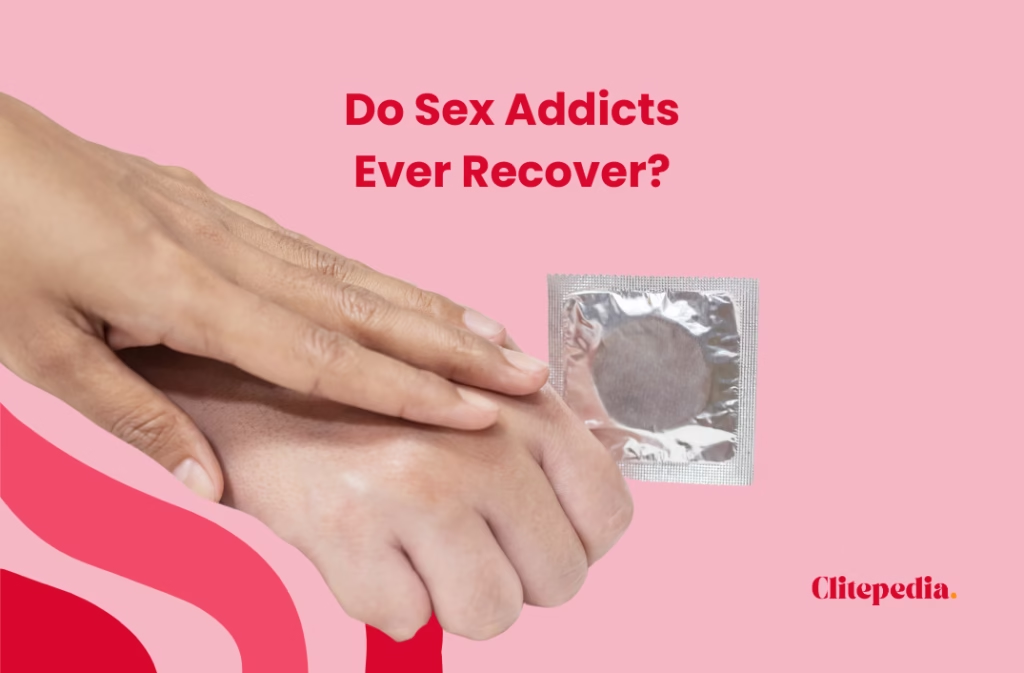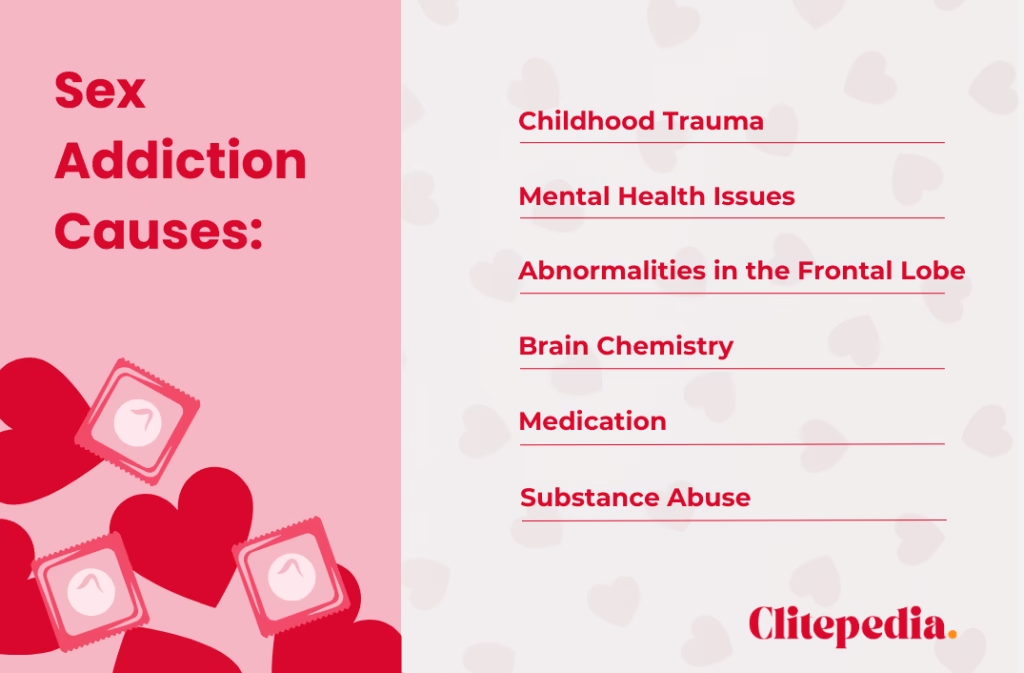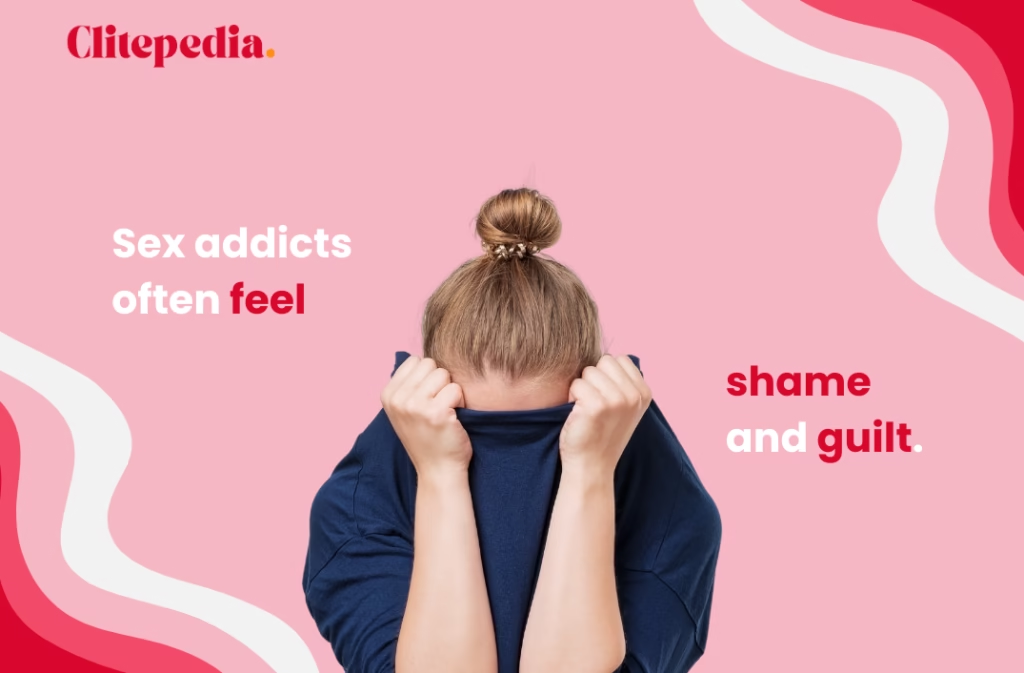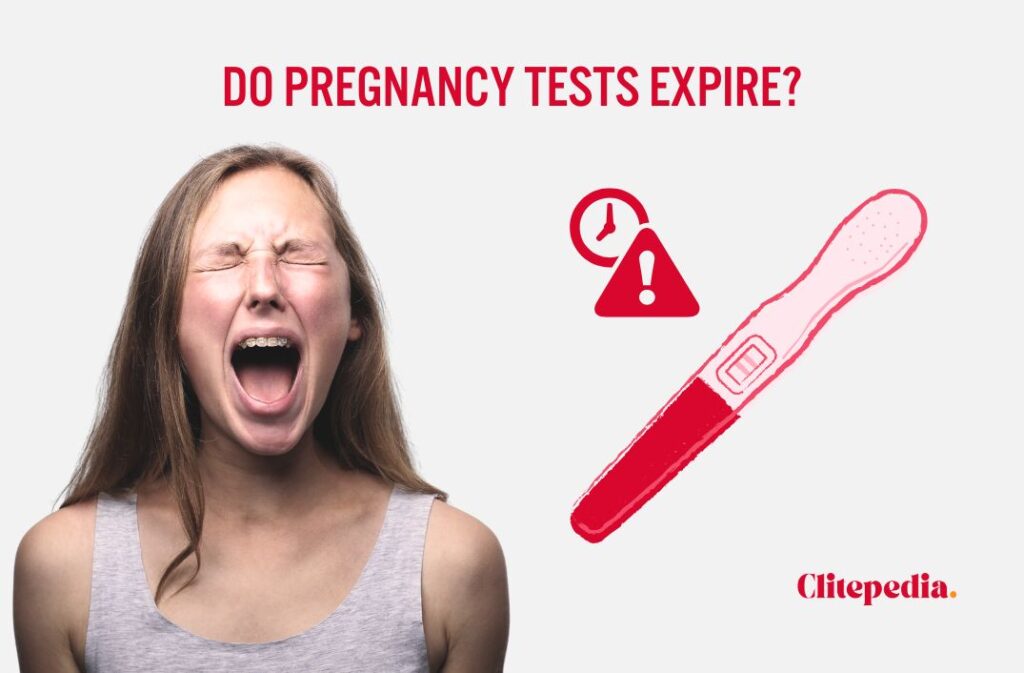Sex addiction… Just a fancy excuse for bad behavior? Is it even a real thing?! Bring this topic up in a room full of people and you’re bound to get polarizing opinions.

But isn’t sex addiction just enjoying sex a bit… too much?
In a way, yes. In the same way that a gambling addict enjoys the casino a bit too much, or a drug addict enjoys drugs a bit too much. Ah now you’re getting it. You see, not fun!
The reality is that sex addiction is a lot more nuanced than any one answer. If you’ve ever wondered whether sex addicts can truly recover, buckle up.
We’re diving headfirst into the nitty-gritty of what sex addiction is, how it’s diagnosed, and what recovery really looks like. Grab a cup of tea (or whatever tickles your pickle), and let’s get into it.
What is Sex Addiction?
Sex addiction, or compulsive sexual behavior, isn’t about having a wild libido or being extra enthusiastic about your Saturday date nights.
It’s a pattern of behaviors – think constant hookups, risky situations, or endless hours on ahem certain websites (may or may not rhyme with Corn Tub) – that feels uncontrollable.

People with sex addiction don’t just enjoy sex; they feel trapped by it, using it to cope with stress, trauma, or other emotions in ways that interfere with daily life.
Think of it as eating chocolate cake. One slice? Eat your heart out. Arranging your life around trips to the bakery? That’s where things get problematic.
Sex Addiction Symptoms
How do you know if sex has gone from “fun hobby” to “uh-oh”? Symptoms include:

- Obsessively thinking about sex (to the point it interferes with work, relationships, or basic hygiene).
- Engaging in risky or inappropriate sexual behaviors.
- 3am Tinder hookup with no condom just to rock your socks off? Probably not a good sign.
- Feeling guilt, shame, or depression after sexual activities – but doing them again anyway. Extreme cases of sex addiction can even cause a person to feel suicidal.
- Trying to cut back but failing. (Sound familiar? It’s similar to other addictions like gambling or alcohol.)
- Masturbating excessively, to the point you’re masturbating at inappropriate times or doing it so often it causes physical discomfort or pain. If petting the cat is starting to feel more like sandpapering the cat, it’s probably time to question what’s going on.
- Cheating on your partner. Sex addicts may feel the need to always have someone new to have sex with despite being in a committed relationship.

Is Sex Addiction Similar to Other Addictions?
Short answer: Yes.
Long answer: Yes, but it’s messier.
Just like substance addiction, sex addiction triggers the brain’s reward system, creating a loop of craving, acting out, and guilt.
The difference? You can live without tequila shots or gambling, but abstaining from anything remotely sexual? Not exactly sustainable.
Unless you’re considering a life in a nunnery.

That’s what makes treating sex addiction so tricky. It’s about finding balance, not total avoidance.
And let’s not forget the stigma. While society often cheers for people recovering from drug or alcohol addiction, sex addiction tends to get the side-eye, dismissed as an excuse for bad behavior. Spoiler: It’s not.
How Common Is Sex Addiction?
Sex addiction is more common than you think but less talked about than your Aunt Margie’s “secret” lasagna recipe.

Studies estimate that about 3-6% of adults may struggle with compulsive sexual behavior. That’s millions of people, meaning you probably know someone (or are someone) dealing with this.
It doesn’t discriminate, affecting men and women across all ages, orientations, and backgrounds. Research does show sex addiction is higher in men. But because of societal taboos and misconceptions, many suffer in silence, making accurate statistics a bit tricky.
High Sex Drive vs. Sex Addiction
Here’s the key difference: a high sex drive is about desire, while sex addiction is about compulsion.
- High sex drive: “I love sex!”
- Sex addiction: “I hate that I feel like I need sex to feel okay, but I can’t stop.”
A high sex drive means you love sex, think about it often, and maybe even schedule your day around a steamy rendezvous. But at the end of the day, you’re in charge, and your life isn’t falling apart because of it.
(Your life may be falling apart because of literally everything else, but that ain’t sex addiction.)
Sex addiction? That’s a different story. Imagine craving sex not because you want it but because you feel like you need it, even when it’s causing problems. It’s not about pleasure – it’s about compulsion.
Think of it this way: a high sex drive is like binge-watching your favorite show – you’re into it, but you can stop and go to bed.

Sex addiction is like those times you kept watching until 4 a.m., knowing you’d hate yourself in the morning but couldn’t tear yourself away. You knew it was bad for you, but you couldn’t stop.
Or that time you were compulsively checking your ex’s socials to see what they were up to. Not your finest moment was it. And looking back, you probably realize it wasn’t the healthiest thing to be doing.
But we’ll pretend that didn’t happen. Anyway, where were we…
A high sex drive is usually a good thing in someone’s life. It’s something they derive pleasure and satisfaction from. A sex addict is usually distressed by their compulsion for sex.
What Causes Sex Addiction?
You’ll be unsurprised to know, it’s not just from loving the horizontal tango a bit too much. But what actually does cause sex addiction is up for debate.

Current thinking suggests possible causes can include:
- Childhood Trauma: Childhood abuse can play a role in sex addicted adults.
- Mental Health Issues: Depression, anxiety, or OCD often go hand in hand with sex addiction.
- Brain Chemistry: The same dopamine rush from chocolate or skydiving applies here, except on overdrive. When there is an imbalance in some neurotransmitters – such as dopamine – this may contribute to hypersexual behaviour.
- Abnormalities in the Frontal Lobe: While the research is limited, there is literature suggesting that frontal and temporal lobe tumors or injuries may be linked to hypersexuality in some cases.
- Medication: It’s that dopamine cropping back up again! One study found that certain Parkinson’s medications, based on dopamine replacement, could be linked to increased compulsive sexual behaviors.
- Substance Abuse: Research shows that substance abuse and sex addiction are often connected. It was actually an Alcoholics Anonymous group that first applied the 12-step program principles from AA, to sex addiction.
Is Sex Addiction Considered a Mental Health Disorder?
Yes, but it’s complicated. While the American Psychiatric Association hasn’t officially categorized sex addiction as its own disorder, it does fall under “Compulsive Sexual Behavior Disorder” in the World Health Organization’s ICD-11.
Fancy terms aside, it’s a legitimate condition that requires proper diagnosis and treatment.
How Does a Sex Addict Feel About Their Sex Addiction?
Well usually, not great. Most sex addicts struggle with feeling of shame, guilt, and a constant sense of inadequacy. They may feel trapped in a cycle they can’t escape, often worrying of the judgement and rejection they may face if they open up.

This emotional burden can lead to anxiety, depression, and even deeper isolation. Ironically, these feelings can contribute to sex addiction in the first place, leading to a negative cycle.
Compassion, not judgment, is key here.
What Are the Complications of Sex Addiction?
Sex addiction doesn’t just stay in its lane; it’s the ultimate messy roommate. And you know we all hate a messy roommate. Left untreated, it can cause:
- Strained or broken relationships.
- Financial troubles.
- Job loss or career stagnation.
- Sexually transmitted infections (STIs).
Diagnosis and Tests for Sex Addiction
Getting diagnosed isn’t as simple as peeing in a cup. A mental health professional will likely assess your behaviors, emotional triggers, and history.

They may use specific screening tools or questionnaires to evaluate the severity of the addiction. Transparency is crucial, this isn’t the time for sugar coating.
Many people suffering with addiction feel a sense of shame, leading to them downplaying the problem. Remember that professionals are not there to judge you, and whatever you think is embarrassing, they’ve heard it all before.
While it might feel like a shameful moment for you, to a professional, it’s just another day in the office! If anything, seeking a diagnosis is something to be proud of. It takes bravery to acknowledge you have a problem and take active steps to resolving it.
Management and Treatment for Sex Addiction
Treatment involves therapy (often Cognitive Behavioral Therapy or CBT), support groups like Sex Addicts Anonymous (SAA), and sometimes medication for underlying conditions like depression.
A treatment plan is highly individualized, focusing on managing triggers and building healthier coping mechanisms. Recovery isn’t about “fixing” someone; it’s about empowering them to regain control over their lives.
Can Sex Addiction Be Prevented?
There’s no foolproof method that 100% guarantees you’ll never be a sex addict. But isn’t that like everything in life?
Working on emotional resilience, healthy communication, and self-awareness can make a world of difference.
Early intervention is key – whether that’s unpacking childhood trauma, breaking the cycle of unhealthy coping habits, or managing exposure to sexualized media.
Outlook/Prognosis
Recovery from sex addiction is absolutely possible, but it’s a journey, not a sprint. You can’t just Usain Bolt your way through this b!tch.

With the right support and tools, many people successfully manage their addiction and lead fulfilling lives.
The key? Patience, persistence, and plenty of self-compassion.
Pam’s Thoughts
Sex addiction is a real issue that’s more about compulsion than pleasure. While it’s still widely misunderstood as someone enjoying doing the deed a little too much, it’s anything but fun for the person going through it.
Sex addiction can wreak havoc on someone’s life, relationships, and mental health.
But the key takeaway here is this: Recovery is possible. There’s no quick fix to get there, but with the right tools and support, it is very much possible.
Whether it’s therapy, support groups, or learning healthier coping strategies, there’s hope for those battling this addiction.
Just like with any addiction, recovery starts with acceptance and understanding.
FAQ
How do I know if I have sex addiction?
If your sexual behaviors feel uncontrollable and are causing distress or harm in your life, it’s time to seek professional help.
Is there a link between sex addiction and depression?
Yes. Many sex addicts struggle with depression, often using sexual behaviors as a way to cope with their emotions.
Can sex addiction be cured?
There’s no “cure,” but it can be effectively managed with therapy, support, and healthy coping strategies.
What can’t sex addicts stop?
They struggle to stop compulsive sexual behaviors, even when faced with serious consequences.
What percentage of sex addicts recover?
Recovery rates vary, but with proper treatment, many see significant improvement.
Is sex addiction a mental illness?
It’s considered a compulsive behavior disorder and often coexists with other mental health conditions.
Sex addiction isn’t an easy topic to tackle, but the good news is that recovery is absolutely possible. If you or someone you know is struggling, don’t hesitate to reach out for help.



